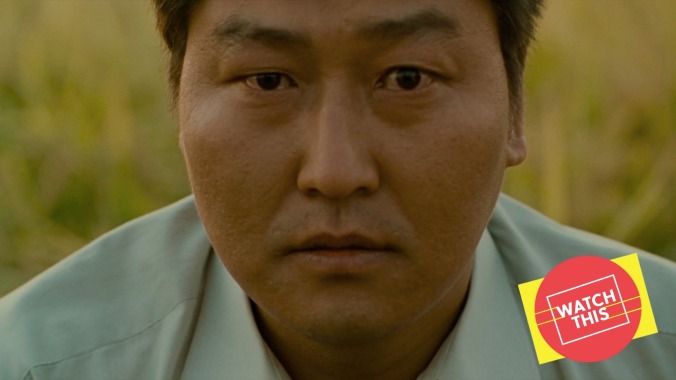Parasite director Bong Joon Ho broke out with an ACAB take on the police procedural

Watch This offers movie recommendations inspired by new releases, premieres, current events, or occasionally just our own inscrutable whims. This week: With the Denzel Washington thriller The Little Things hitting theaters and HBO Max, we’re looking back at other movies about detectives hunting serial killers.
Memories Of Murder (2003)
Like a cold case belatedly reopened, Memories Of Murder has become an object of interest again. It wouldn’t take a world-class gumshoe to guess why. First released in 2003, this gripping, eccentric police procedural is the second feature by Bong Joon Ho, the acclaimed South Korean filmmaker who wrote and directed Parasite. Neon, Stateside distributor of the Best Picture winner, rereleased his earlier movie last fall, making newly available a film that had become difficult to see (at least legally). But even before that deserved return to American screens or the surprise ending of Oscar night, Memories Of Murder was back in the spotlight. What put it there was unexpected developments in the real-life investigation the movie dramatizes—namely, the revelation, in October of 2019, that authorities had finally identified the culprit in a string of brutal killings that rocked Korea some three decades earlier.
From 1986 to 1991, the bodies of 10 women were found in Gyeonggi Province, all within the same six-kilometer radius, in what would come to be called the Hwaseong serial murders. The statute of limitations expired before police were able, nearly 30 years later, to tie several of the killings to the perpetrator, Lee Choon-jae, using DNA evidence. (From there, they secured a full confession from Lee, who was already serving a life sentence for killing his sister-in-law.) Bong made Memories Of Murder during the long stretch when the case was effectively dead, and that lack of closure is the film’s philosophical backbone. Loosely drawing on the details of this true crime story, Bong adopts the perspective of a group of bumbling, hotheaded rural cops, led by Detective Park (Song Kang-ho, the filmmaker’s favorite leading man), as they stagger from one suspect to another, chasing various leads to various dead ends, and getting hung up on clues that fail to bring them much closer to the truth.
Because of the severity of the crimes, the length of the investigation, and the general assumption that the case would never be solved, the Hwaseong murders have been likened to those of the Zodiac. In turn, Memories Of Murder would go on to earn retroactive comparisons to David Fincher’s Zodiac, released a few years later. The films have plenty in common—they’re both thrillers that follow the winding course of a confounding, years-spanning manhunt, centering the obsessive drive of the investigators en route to an ending of haunting inconclusiveness. (They even share climactic scenes of characters searching for signs of guilt in the eyes of their prime suspect.) But Bong’s sensibility is entirely his own; like every movie he’s made since, Memories skillfully juggles a number of tones. Scenes of white-knuckle excitement, like a foot chase that leads into a bustling construction site, bump up against the filmmaker’s pronounced sense of screwball humor. This is at once a deeply sad film, offering a vision of a world where justice remains forever out of reach, and a sometimes screamingly funny one, thanks to a droll appreciation for the farcical absurdity of the detectives’ numerous screwups.
When the big news broke, Bong spared some kind words for those who cracked the case and “their endless effort to find the culprit.” His film, though, is much less reverential. Watching it today, it’s clear that while Memories unfolds entirely from the point of view of the officers, this is far from an admiring portrait. Park and his unit aren’t just amusingly incompetent. In their willingness to violently coerce confessions, they’re also walking emblems of the profession’s civic and moral failures. Even the big-city cop (Kim Sang-kyung) who shakes his head at his new colleagues’ corrupt methods eventually sinks to their level, at one point rejecting hard evidence staring him in the face because it contradicts his bone-deep certainty that they’ve found their man. Memories, in other words, is as much an indictment of police work (and the long-trumpeted concept of the detective’s intuition) as a stirring fictionalization of it. That makes it one of the most remarkable tightrope acts in a career full of them. Who but Bong could get you hooked on the nitty-gritty of a case while casting aspersions on the broken institution devoted to solving it?
Availability: Memories Of Murder is available to rent or purchase digitally from Amazon, Google Play, Apple, YouTube, Microsoft, Fandango Now, Redbox, DirectTV, and VUDU.